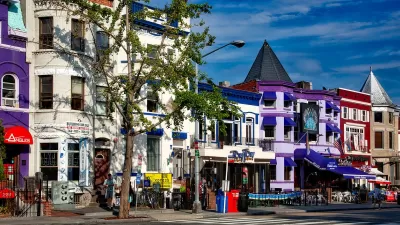After a group of unrelated adults bought and moved into a large house in Hartford, Connecticut, they were found to be in violation of local regulations. They are asking for a broader definition of 'family.'

Eleven adult friends moved into 69 Scarborough Street in Hartford, planning to make a home there. "Like others, they bought their home and live here in apparent domestic harmony and all 12 consider themselves a family. Except, this group of 11 actually includes three couples, with three children, and two single people. They're all longtime friends, who decided years ago, they wanted to live together."
Some neighbors were none too pleased with this arrangement. From the article: "Someone complained to the city, which determined in October that the living arrangement violates the zoning code for the neighborhood, which specifies that although the houses may be massive, no more than two unrelated people can live in them. It came as a surprise to the group."
This approach to communal living isn't unheard-of: "Some cities and towns have found a way to address these kinds of living arrangements, they call it a 'functional family' and that definition actually describes this group pretty well: they must have an ownership interest, share housekeeping duties, which usually means is there is only one kitchen, and other specifications so that these homes don't end up as boarding houses."
FULL STORY: 11-person 'family' causing housing dispute in Hartford

Maui's Vacation Rental Debate Turns Ugly
Verbal attacks, misinformation campaigns and fistfights plague a high-stakes debate to convert thousands of vacation rentals into long-term housing.

Planetizen Federal Action Tracker
A weekly monitor of how Trump’s orders and actions are impacting planners and planning in America.

Chicago’s Ghost Rails
Just beneath the surface of the modern city lie the remnants of its expansive early 20th-century streetcar system.

Bend, Oregon Zoning Reforms Prioritize Small-Scale Housing
The city altered its zoning code to allow multi-family housing and eliminated parking mandates citywide.

Amtrak Cutting Jobs, Funding to High-Speed Rail
The agency plans to cut 10 percent of its workforce and has confirmed it will not fund new high-speed rail projects.

LA Denies Basic Services to Unhoused Residents
The city has repeatedly failed to respond to requests for trash pickup at encampment sites, and eliminated a program that provided mobile showers and toilets.
Urban Design for Planners 1: Software Tools
This six-course series explores essential urban design concepts using open source software and equips planners with the tools they need to participate fully in the urban design process.
Planning for Universal Design
Learn the tools for implementing Universal Design in planning regulations.
planning NEXT
Appalachian Highlands Housing Partners
Mpact (founded as Rail~Volution)
City of Camden Redevelopment Agency
City of Astoria
City of Portland
City of Laramie




























